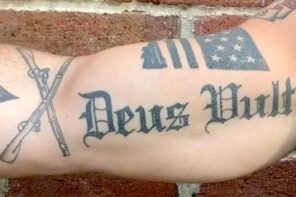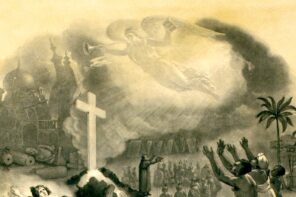On March 18, three days after the terrorist attack on a New Zealand mosque, RD published a brief post by regular contributor Murali Balaji that was, or so we thought, fairly uncontroversial. In it, Balaji sought to broaden the conversation over the terrorist’s motives—widely described as Islamophobic—and to characterize his perspective as part of a larger movement of “Christian nationalism [that] has entrenched itself into white majority countries.”
Shortly after it went live there was a backlash, with many taking exception to the use of “Christian” to describe the terrorist’s identity or the broader movement of which his ideas—if not he himself—are clearly a part.
This, despite the fact that, while he hedges on the direct question as to whether or not he identifies as a Christian—whether religiously or culturally—his manifesto is littered with historical and contemporary references to defending Christendom against Muslim invaders (as religious studies scholar Ivan Strenski points out in his piece on RD). It should be noted, however, as scholar of early Christian history Tony Keddie explains in his RD piece, that some of these references are based on “the deeply flawed historical claims of white nationalist pseudo-intellectuals and their trolling internet henchmen.”
John W. Morehead, an evangelical who works in multi-faith engagement, does not agree. He argues that while Christian nationalism is a real American phenomenon, and one that shares traits with the broader white nationalist movement, it was “white nationalism [that] provided the ideological narrative, not Christian nationalism.”
In his response to Morehead, Balaji disagrees, noting that the terrorist’s manifesto is “not subtle in its call for Christian supremacy and destruction of Islam,” and that “the terrorist seems to make both implicit and explicit references to a dream that many white Christian nationalists share: a return to white Christian dominance over its non-white, non-Christian others.”
In the end, while RD stands by its characterization of the ideology behind the attack as being meaningfully “Christian”—in the sense of being firmly rooted in Christian cultures and identity—we recognize that it will probably be a contentious issue for some time to come. In any case, we hope you will read the fine work of all of our contributors below and make up your own mind.
— eds
For all pieces on the New Zealand terrorist attack, click here. Below are the pieces that directly address the “White Christian Nationalism” question:
March 18:
Behind New Zealand Terror Attack Is a Problem Bigger Than Islamophobia (Murali Balaji)
March 21:
White Christian Nationalism May Not Be Religious, But It Is Christian (Murali Balaji)
March 29:
The White Nationalist Fantasy of Ancient Christian-Muslim Conflict Would Get an ‘F’ in History Class (Tony Keddie)
Whether We Call White Nationalism ‘Christian’ Is All About Who Gets to Define Christianity (Ivan Strenski)
Misdiagnosing Nationalism as ‘Christian’ Exacerbates the Challenges of Islamophobia: A Response to Murali Balaji (John W. Morehead, including a reply from Murali Balaji)





